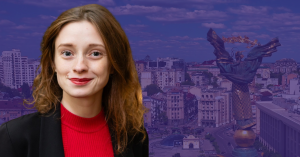During the past couple of months (actually, more than a year) the digital reality has proven to have one major advantage over the physical world: it remained relatively unaffected by the pandemic crisis. When it comes to the gaming industry, we have seen an unprecedented rise in the number of gamers, who, already surpassing 2.7 billion on a global scale, have invested over $60B in games solely in 2020. As a result, the gaming sector is projected to reach $200B by 2023, leaving a lot of space for gaming centers to develop and create new products, upgrading those created so far.
Serbia is well-known for its game development experts, distributed in several hubs across the country. Already showing signs of accelerated development, the local gaming industry has supplied major entertainment companies such as Warner Bros, Epic Games, and Playrix, with its solutions. According to the Annual Gaming Report for 2020, published by the Serbian Games Association, a non-profit NGO, invested in supporting the national gaming industry, the positive trends that we’ve been observing in the past couple of years, have advanced. The Serbian ecosystem is devoting effort and resources to nurturing its Digital Serbia Initiative, as well as implementing changes in its ecosystem structure and educational system. Here are the trendiest highlights from the report:
Hubs in the making
Currently, the Serbian gaming ecosystem comprises around 120 companies, studios, and indie teams, most of which (58, to be exact) are based in Belgrade. Novi Sad comes second with around 22 game development teams, while Nis, the third main hub, is the home of 3 gaming startup offices. The generated total revenue by the gaming sector in Serbia, according to the report, amounts to around €120M, an increase of €60M, compared to 2018. The number of employees, on the other hand, has also increased from 1325 in 2019 to 1431 (386 of which women) in 2020. This can be attributed to the increasing number of opportunities, offered by the new companies, the steady growth of the local gaming sector, and Serbia’s continuous efforts to involve students in the game development startup world through internships and studying opportunities.
The ecosystem is still characterized by small and diverse teams, with 56% of the startups having between 1 and 5 employees and only 8% employing between 50 and 200 cadres. The ecosystem has also seen the rise of indie teams and individuals that develop their games without the support of game publishers, contrastingly to AAA developers. According to the report, the 2021 plans of the sector include employing more people, with 66% of the companies putting it on their agenda. For now, programming specialists and artists remain in the greatest demand from startups.
Development opportunities
In 2020, 34% of the SGA members that employed students shared that they are mostly satisfied with the quality of their work. During this year, the educational sector launched the Master 4.0 in Gaming studying program at the University of Kragujevac, while it is now in the process of introducing the first master program of this kind at the University of Arts in Belgrade, with the plans being it will be launched in 2021. At the same time, the ecosystem is working on educating teachers as the local Crater Training Center, having received a mega grant from American gaming development giant Epic Games, developed a special Unreal Engine to provide a cohort of 30 university professors with the knowledge base and expertise needed by their students to enter the gaming development industry. In response not only to the pandemic but to the growing number of game development hubs, Nordeus Hub which is under the umbrella of mobile games developer Nordeus has been invested in creating an online Serbian ecosystem and providing developers with a range of courses and programs.
Issues to be addressed
Almost 61% of the revenue of the gaming sector comes from direct sales, representing an increase of 9%, compared to 2019. With a total of 41 games published in 2020, developers are earning most of their revenue via mobile and PC/MAC platforms (45% and 32%, respectively), thus achieving a download rate that exceeds 350 million times. Most of the games are premium or Free-to-play including ads with the average game taking 12 months to be finalized and a maximum budget of €500K.
In 2020, around 65% of the games were self-published, alarming the problem, connected to the lack of investors for the sector. This, as well as other issues, such as the double taxation with the USA and the absence of console support for Serbia, represent the biggest challenges for the local gaming industry developers, the report outlines. The most anticipated changes in the ecosystem, outlined by companies, are the introduction of tax incentives and better educational and cofinancing opportunities.
Who is who in the Serbian gaming ecosystem
3Lateral – an AAA gaming development company, specializing in the development of 3D and 4D face and body gamification to provide realistic human characters. In 2019, the company was acquired by Epic Games Inc. and in February 2021, it introduced its MetaHuman project that allows users to create photorealistic digital characters.
Digital Arrow – with a team of 30 developers, the company is invested in outsourcing mobile and PC/MAC games. Currently, Digital Arrow is developing a game for THQ Nordic (previously known as Nordic Games).
Fortuna Esports – founded in 2015, the company operates in the sphere of eSports, combining event management, studio and video production. Becoming the first in the region to acquire rights for creating eSports content, it has developed shows for Riot Games’ LOL Esports tournament and the Esports Balkan League.
Mad Head Games – the company became a part of the Embracer group in November 2020. They are the company behind several popular HOPA games, including its Rite of Passage game series.
Nordeus – representing one of the bigger companies in the local sector, Nordeus has a team of more than 170 developers from 20 countries. Their Top Eleven football game has over 230 million registered users. Apart from that, they praise themselves for participating in a number of not-for-profit initiatives, including the Digital Serbia Initiative and the SGA.
Peaksel – specialized end-to-end development of mobile games and apps for Android and iOS, the Nis-based company has so far published over 300 games with no external funding.
Playrix RS – part of Playrix, one of the biggest mobile game developers in the world, Playrix RS is the developer of Homescapes, Gardenscapes, Township, and Fishdom who have been among the Top 50 Grossing Apps on Google Play and App Store with an active users number over 100 million on a monthly basis.
Two Desperados – with a team of 60, the company is known for developing the top-positioned Waka Waka and Viola’s Quest games that have attracted over 30 million users globally. It is also one of the companies currently working on an AI hub.
Ubisoft Belgrade – established in 2016, the Belgrade team consists of 200 people, who are part of the biggest internal development team in the world (over 14000 people) of the originally French Ubisoft. The Serbian team has been working on the top-charting Ghost Recon, Steep, The Crew2, Rainbow Six, Riders Republic, and Skull & Bones.
Webelinx Games – the game development studio, known for its Love Story games series, has achieved over 1 billion downloads on the mobile app market.
Yboga – established in 2016 in Belgrade, the company is focused on creating mobile simulation and management games. Its game Dream Hospital has achieved over 5 million downloads.
Bunker VFX – the Belgrade-based visual effects studio is specialized in developing High-End AAA and mobile game trailers, with some of its clients being Red Barrels, Warner Bros Entertainment, Bethesda Softworks, and Electronic Arts.
Brave Giant – founded in 2012, the company stands behind the Demon Hunter and Family Mysteries game series.
COFA Games – with more than 1 million organic downloads, the company’s Awakening of Heroes game was awarded as the best multiplayer game at Casual Connect.
Sozap – the Armed Heist game of the Serbian-Swedish game development studio has had over 14 million downloads on Android and App Store.
HORA Games – merging cryptocurrency with gaming, the company’s Idle Miner game has over 250 million downloads on Google Play and App Store.








